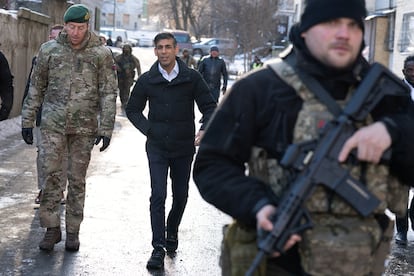Rishi Sunak bangs the war drum ahead of a make-or-break election year in the United Kingdom
The Conservative government has ended ‘the era of peace dividends’ ushered in by Margaret Thatcher and predicts new conflicts with Russia, China, North Korea, and Iran in the years to come

It seems like an unlikely coincidence. 2024, the year in which the United Kingdom’s Conservative government faces a predicted wipe-out at the ballot box — all polls indicate an advantage of at least 18 percentage points for the Labour opposition — is the very year it has chosen to flex its military muscle. “The era in which we were able to reap the dividends of peace has ended. In five years’ time we could be looking at multiple theatres including Russia, China, Iran, and North Korea,” British Defense Minister Grant Shapps said this Monday in his first speech of any substance since he was appointed by Prime Minister Rishi Sunak at the end of August. The peace dividends, Shapps has explained, were a result of the end of the Cold War during Margaret Thatcher’s tenure. They were years without clear enemies in which public money could be allocated to education and health rather than to tanks or fighter jets.
The drums of war came to Boris Johnson’s rescue in his last months as Prime Minister, when his reputation was already at rock bottom due to the “partygate” scandal — parties held in Downing Street, in breach of the government’s own guidelines, during the UK’s Covid lockdowns. Unconditional support for Ukraine, and its president, Volodymyr Zelenskiy, briefly restored Johnson’s popularity. The idea that the United Kingdom was still a country whose military weight is decisive in any international conflict — the Rule Britannia that sounds so sweet to the ears of those who supported Brexit — has been the lifeline of a Conservative Party in search of its place in the world after severing its ties with the European Union.
And Sunak has also chosen that trick. Within 24 hours, he made a surprise trip to Kyiv to meet with Zelenskiy and reaffirm his commitment to the Ukrainian cause, with the announcement of an extra £2.4 billion ($3 billion) in military aid. At the same time, the joint attack by American and British forces on facilities belonging to the Houthi rebels in Yemen was also announced. The US and UK Adminsitrations say that their retaliatory attacks are due to repeated Houthi assaults in recent weeks on commercial and military vessels that use the Red Sea route.
“In dangerous times, we are investing in defense, hardening our critical infrastructure and building our alliances. We are resolute in our principles: international security; the rule of law; and freedom to determine your own future. An attack on those principles is an attack on everything that we believe in and on which our lives and livelihoods depend,” Sunak said this Monday in parliament.
Aware that any military intervention in which the next steps are not clear — for example, Iraq in 2003, or Syria in 2013 — can be a political hornet’s nest. Sunak showed respect to Parliament and the opposition — Labour has supported the intervention in Yemen — and avoided aggressive rhetoric. He left that to his Minister of Defense, who hours before had not hesitated to describe the leftist forces as weak in the face of the current threats in the world.
“This is the time to decide our defense policy. The choice is hard. Some, especially on the left, are tempted to always undervalue our country. They believe that the United Kingdom no longer has the strength to influence world events, that we should retreat and ignore what happens beyond our shores,” Shapps said in his speech.
“We find ourselves at the dawn of a new era in which we are moving from a post-war to a pre-war world. Old enemies are reanimated. New foes are taking shape. The foundations of the world order are being shaken to their core,” Shapps announced, without anticipating any increase in the defense budget beyond what the British government had already announced.
The United Kingdom allocates more than $68.5 billion annually to military spending, approximately 2% of its budget. It has recently announced new budget items to modernize its nuclear arsenal and to resupply ammunition and weapons, after a year of continuous supply of materiel to Ukraine. Shapps has called on NATO members that have not yet done so to comply with the commitment to allocate 2% of their GDP to defense spending. Downing Street has reaffirmed its willingness to reach 2.5% when the accounts allow.
The Minister of Defense has also announced the United Kingdom’s decision to send more than 20,000 members of its armed forces to the joint military exercise Steadfast Defender organized by NATO in the first half of 2024, with the participation of its 31 partner countries along with Sweden.
Sign up for our weekly newsletter to get more English-language news coverage from EL PAÍS USA Edition
Tu suscripción se está usando en otro dispositivo
¿Quieres añadir otro usuario a tu suscripción?
Si continúas leyendo en este dispositivo, no se podrá leer en el otro.
FlechaTu suscripción se está usando en otro dispositivo y solo puedes acceder a EL PAÍS desde un dispositivo a la vez.
Si quieres compartir tu cuenta, cambia tu suscripción a la modalidad Premium, así podrás añadir otro usuario. Cada uno accederá con su propia cuenta de email, lo que os permitirá personalizar vuestra experiencia en EL PAÍS.
¿Tienes una suscripción de empresa? Accede aquí para contratar más cuentas.
En el caso de no saber quién está usando tu cuenta, te recomendamos cambiar tu contraseña aquí.
Si decides continuar compartiendo tu cuenta, este mensaje se mostrará en tu dispositivo y en el de la otra persona que está usando tu cuenta de forma indefinida, afectando a tu experiencia de lectura. Puedes consultar aquí los términos y condiciones de la suscripción digital.









































